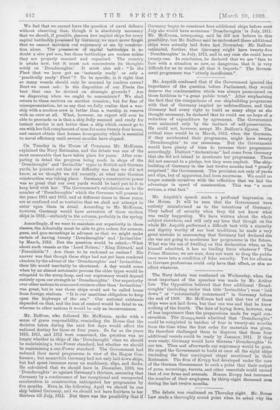Mr. Balfour, who followed Mr. McKenna, spoke with a sense
of grave responsibility, reminding the House that the decision taken during the next few days would affect the national destiny for three or four years. So far as the years 1910, 1911, and 1912 were concerned, the question was no longer whether in ships of the 'Dreadnought' class we should be maintaining a two-Power standard, but whether we should be maintaining a one-Power standard. The Government had reduced their naval programme in view of the Hague Con- ference; but meanwhile Germany had not only laid down ships, but had spent immense sums on machinery, slips, and docks. He calculated that we should have in December, 1910, ten ' Dreadnoughts ' as against Germany's thirteen, assuming that Germany by a continuance of her exceptional and unexpected acceleration in construction anticipated her programme by five months. Even in the following April we should be one ship behind Germany, and we should not have fourteen to her thirteen till July, 1911. But there was the possibility that if Germany began to construct four additional ships before next July she would have seventeen Dreadnoughts' in July, 1911. Mr. McKenna, interposing, said he did not believe in this possibility, but Mr. Balfour said he understood these additional fillips were actually laid down last November. Mr. Balfour estimated, further, that Germany might have twenty-five 'Dreadnoughts' in July, 1912, and in any case she could have twenty-one. In conclusion, he declared that we are "face to face with a situation so new, so dangerous, that it is very difficult for us to realise all that it imports." The Govern- ment programme was "utterly insufficient."










































 Previous page
Previous page